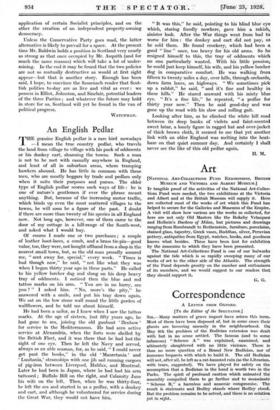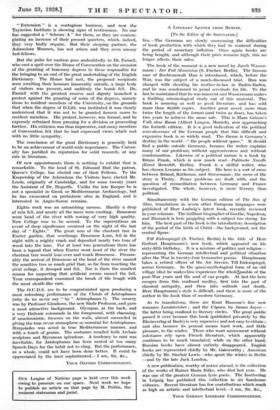Correspondence
A LETTER FROM OXFORD.
[To the Editor of the SPECTATOR.] SIR,—Many matters of grave import have arisen this term. Most of them have been disposed of, but in some cases their ghosts are hovering uneasily in the neighbourhood. Oz May 8th the problem of the Bodleian extension was dealt with but in no sense settled.' The famous (and to some infamous) " Scheme A " was explained, examined, and ultimately slaughtered with no little violence. -There is thus no more question of a Brand New Bodleian, nor of immense bequests with which to build it. The old Bodleian will not, after all, be left as a rat-haunted ruin (as the Librarian, with tears, suggested). We have played for safety on the assumption that a Bodleian in the hand is worth two in the Parks. The spirit of profound caution which animated the assembly compelled them to go further and' to assassinate
" Scheme a harmless and anaemic compromise. The result is stalemate and Bodley stands where' Bodley stood. But the problem remains to be solved, and there is no solution yet in sight. " Extension " is a contagious business, and now the Taylorian Institute is showing signs of restlessness. No one has suggested a " Scheme A " for them, so they are contem- plating an increase of their present quarters, which, indeed, they very badly require. But their sleeping partner, the Ashmolean Museum, has not arisen and they seem uneasy bed-fellows.
But the palm for caution goes undoubtedly to Dr. Parnell, who cast a spell over the House of Convocation on the occasion of the granting of honorary degrees to those responsible for the bringing to an end of the great undertaking of the English Dictionary. The. House had met, the proposed recipients were awaiting their honours innocently outside, a large body of visitors was present, and suddenly the bomb fell. Dr. Farrell with the greatest reserve and dignity launched a protest against the granting of some of the degrees, namely those to resident members of the University, on the grounds that when the degree of D.Litt. was instituted it was clearly understood that it was not to be granted honoris causa to resident members. His protest, however, was formal, and he expressly refrained from pressing for a division or proceeding further. His criticism was thus impressive, and many members of Convocation felt that he had expressed views which met with no little sympathy.
The conclusion of the great Dictionary is generally held to be an achievement of world-wide importance. The Univer- sity has justified its reputation for solid research, at any rate in literature.
Of new appointments there is nothing to exhibit that is remarkable. To the head of St. Edmund Hall the patron, Queen's College, has elected one of their Fellows. To the Keepership of the Ashmolean the Visitors have elected Mr. Leeds, originally of Cambridge, and for some twenty years the Assistant of Dr. Hogarth. Unlike the late Keeper he is not a specialist in Greek or Mediterranean Archaeology, but he has excavated on prehistoric sites in England, and is interested in Anglo-Saxon remains.
Eights week was an astonishing success. Hardly a drop of rain fell, and nearly all the races were exciting. Brasenose went head of the river with rowing of very high quality. New College rose to be second. To the superstitious an event of deep significance occurred on the night of the last day of " Eights." The great arm of the chestnut tree in Exeter garden, that overhangs Brasenose Lane, fell in the night with a mighty crash and deposited nearly two tons of wood into the lane. For at least two generations there has been a legend that when Exeter went head of the river the chestnut tree would lean over and touch Brasenose. Presum- ably the arrival of Brasenose at the head of the river caused the sensitive tree so much grief that, so far from touching the 'rival college, it drooped and fell. Nor is there the smallest reason for suspecting that artificial means caused the fall. Your correspondent examined the break of the bough with the most sleuth-like care.
The O.U.D.S. are to be congratulated upon producing a most refreshing performance of the Clouds of Aristophanes (why do we never say " by " Aristophanes ?). The scenery was by Professor Gleadowe, the new Slade Professor, and gave a most attractive background. Olympus, at the back, and a very Hellenic colonnade in the foreground, with charming, if anachronistic, frescoes on the walls, almost succeeded in giving the true revue atmosphere so essential for Aristophanes. Strepsiades was acted in true Mediterranean manner, and with a touch of genius. The costumes recalled both Archaic sculpture and Mycenean splendour. A tendency to rant was inevitable, for Aristophanes has been ranted at too many Speech-Days for the habit not to cling. But the performance, as a whole, could not have been done better. It could be appreciated by the least sophisticated.—I am, Sir, &c., YOUR OXFORD CORRESPONDENT.































 Previous page
Previous page